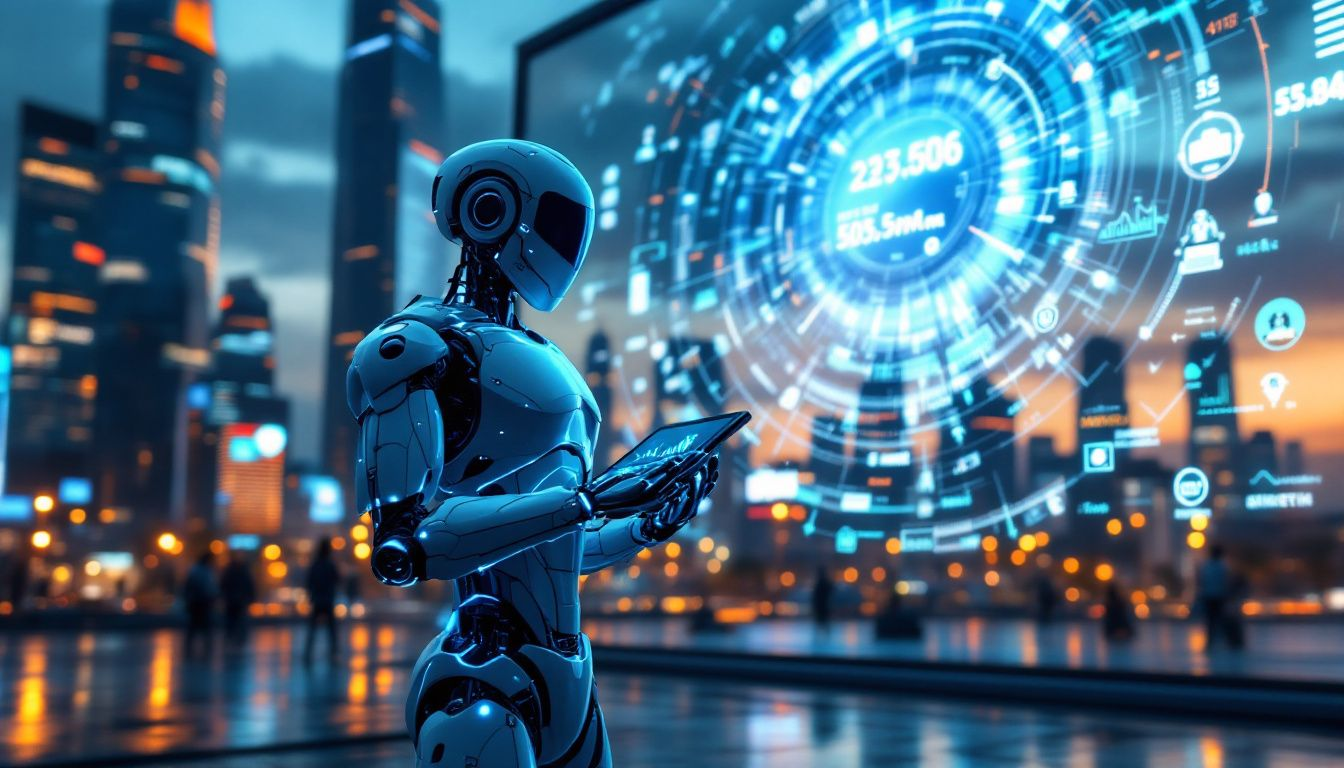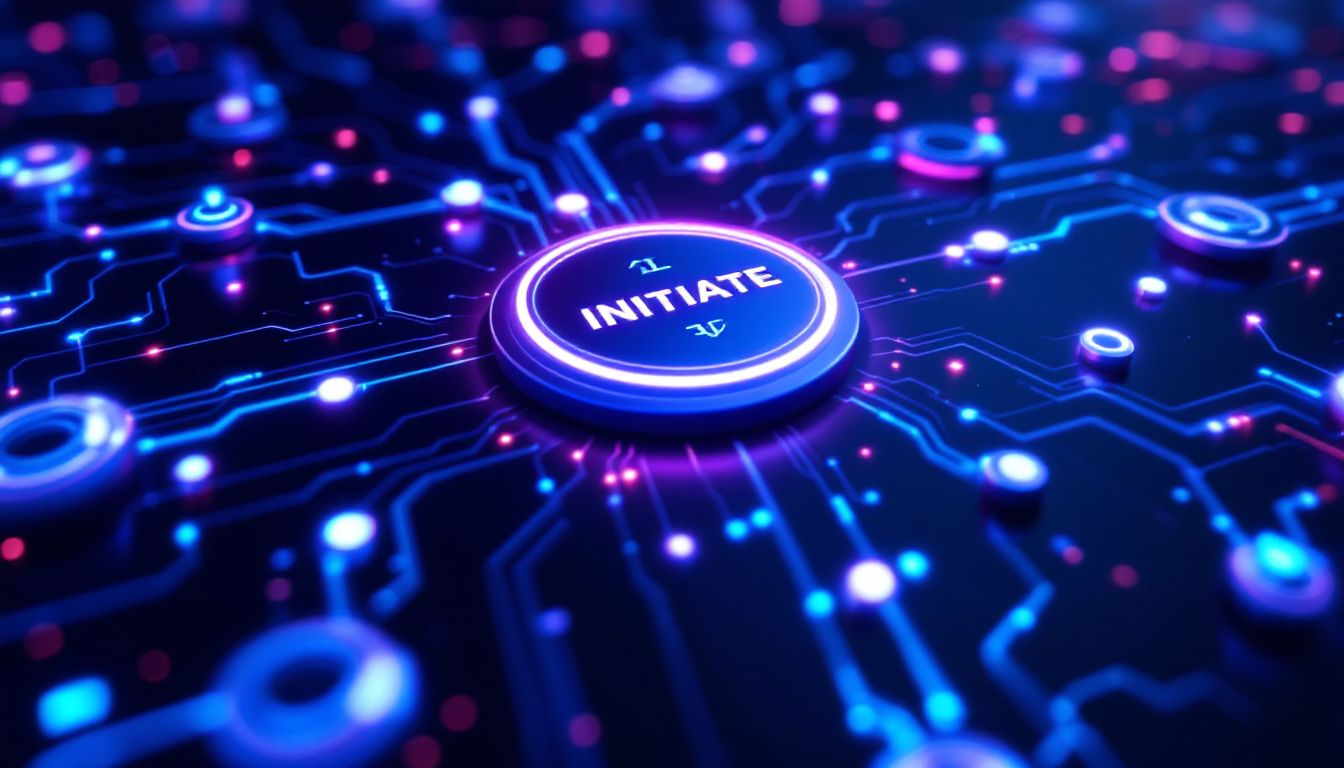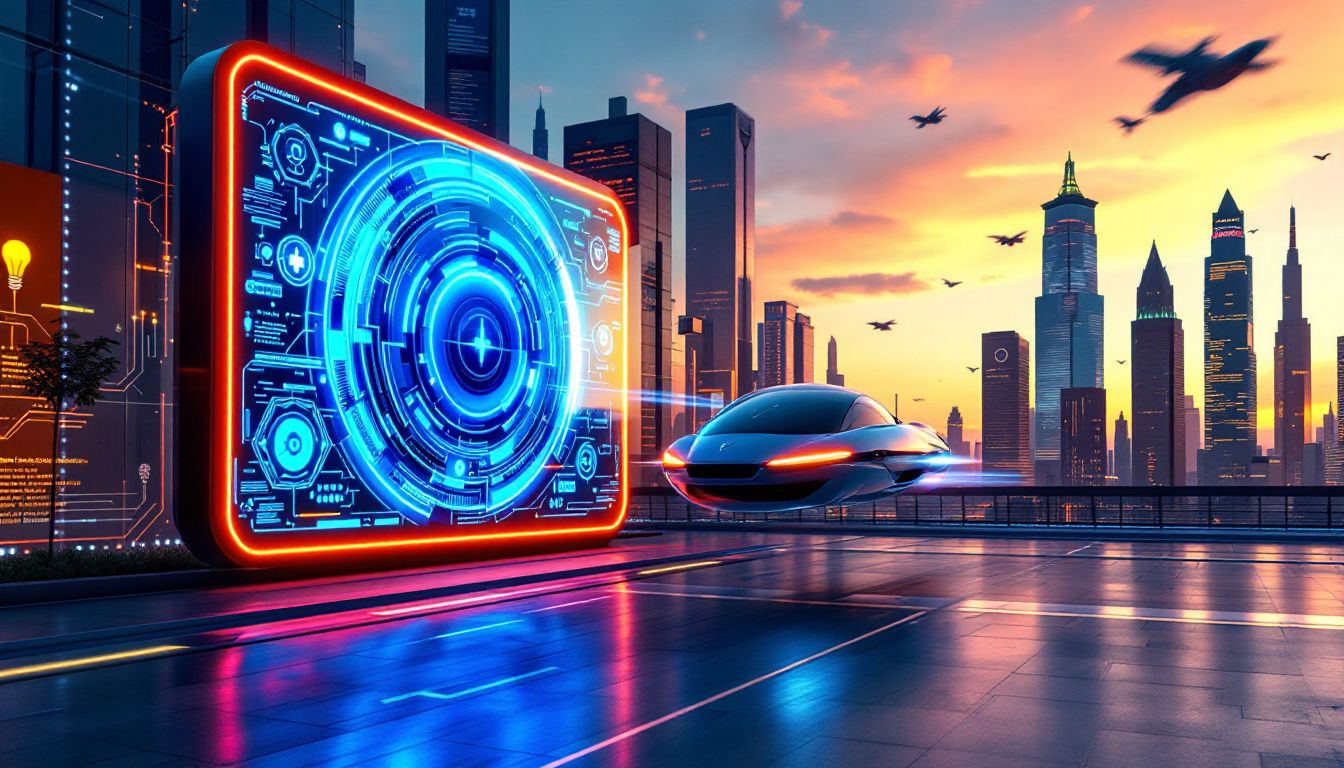Curious about how AI marketing automation can streamline your marketing efforts? AI marketing automation optimizes tasks, improves efficiency, and enhances decision-making. This article covers top AI tools, their benefits, and practical uses to boost your marketing strategy.
Key Takeaways
-
AI marketing automation enhances efficiency and effectiveness by automating repetitive tasks and enabling data-driven decisions.
-
Personalization and predictive analytics are key applications of AI tools, allowing businesses to tailor marketing campaigns and understand customer behaviors more accurately.
-
Implementing AI marketing tools like HubSpot, Salesforce Marketing Cloud, and Jasper is essential for optimizing marketing strategies and driving business growth.
Understanding AI Marketing Automation

AI marketing automation is the fusion of artificial intelligence technologies with marketing efforts to streamline and optimize processes. This powerful combination allows businesses to leverage AI marketing tools to enhance their marketing strategy, automate marketing tasks, and make data-driven decisions that improve overall efficiency and effectiveness. Integrating machine learning, predictive analytics, and AI algorithms allows businesses to gain valuable insights into customer behavior, personalize marketing campaigns, and create more engaging customer interactions.
Understanding AI marketing automation is essential for staying competitive in today’s digital marketing landscape. Implementing AI marketing tools allows companies to automate repetitive tasks, optimize workflows, and enhance digital campaigns.
This saves time and resources, enabling marketing teams to focus on strategic initiatives that drive growth and customer engagement. The next sections will delve into the definition of AI marketing automation and explore its numerous benefits.
Definition of AI Marketing Automation
AI marketing automation is the application of AI technologies in marketing settings, enabling businesses to automate various marketing processes. These processes include data analysis, predictive modeling, and automated customer interactions, all of which are powered by machine learning and artificial intelligence technologies. At its core, AI marketing automation involves the use of AI to analyze marketing data, predict customer behavior, and make informed decisions that enhance marketing strategies and campaigns.
The key components of AI marketing automation include data analysis, which helps marketers uncover hidden patterns and insights through customer data analysis, and predictive modeling, which enables businesses to predict customer behavior and tailor marketing efforts accordingly.
Additionally, AI-powered marketing automation tools can send personalized emails at scale, enhancing customer engagement and satisfaction. Implementing AI marketing automation improves efficiency and effectiveness in marketing strategies.
Benefits of AI Marketing Automation
One of the most significant benefits of AI marketing automation is the increase in efficiency it provides by automating tedious tasks, allowing marketers to focus on strategy and business growth. Leveraging AI marketing tools allows businesses to optimize ad spend, streamline expenses, and improve cost savings. Additionally, personalizing marketing campaigns through AI meets consumer expectations for tailored interactions, enhancing satisfaction and loyalty.
Another critical benefit of AI marketing automation is its impact on return on investment (ROI). Integrating AI into marketing strategies enhances campaign effectiveness, resulting in improved ROI. AI-powered tools enable personalized interactions, accurate targeting, and data-driven decision-making.
Ultimately, AI marketing automation enables more effective strategies, increased customer engagement, and business growth.
Key Applications of AI in Marketing Automation

AI marketing automation significantly optimizes marketing tasks through various applications, enabling businesses to leverage AI marketing tools for enhanced efficiency and effectiveness. Some key applications of AI in marketing automation include personalization of marketing campaigns, predictive analytics for understanding customer behavior, and automated lead scoring and nurturing. These applications not only improve marketing workflows by automating repetitive tasks but also assist marketers in focusing more on strategic activities.
With over 80% of marketers currently utilizing AI technologies, it is evident that AI plays a crucial role in optimizing marketing strategies and campaigns. Implementing AI marketing tools provides valuable insights into customer behavior, tailors marketing efforts to individual needs, and improves overall performance.
In the following subsections, we’ll explore these key applications in more detail, highlighting their benefits and real-world examples.
Personalization of Marketing Campaigns
Personalization has become a cornerstone of effective marketing strategies, with 71% of consumers expecting personalized interactions from brands. When customers don’t receive personalized experiences, 76% report feeling frustrated, underscoring the importance of tailored marketing efforts. AI marketing tools enable businesses to create detailed customer profiles and deliver targeted advertising tailored to individual customer preferences and behaviors.
Dynamic personalization through AI allows businesses to adjust content based on real-time customer interactions, leading to enhanced customer engagement and satisfaction. For example, Whole Foods sends targeted promotions based on purchase histories, while Sephora uses AI-driven product recommendations to improve customer engagement significantly.
These examples highlight the power of AI in creating personalized marketing campaigns that resonate with customers and drive business growth.
Predictive Analytics for Customer Behavior
Predictive analytics is a powerful application of AI in marketing automation, allowing businesses to forecast customer behavior and trends, aiding in strategic decision-making. AI tools analyze large datasets to predict customer behavior, allowing marketers to tailor efforts with greater accuracy and effectiveness. This deeper understanding of customer behavior helps businesses create more targeted and successful marketing campaigns.
For example, Whole Foods tracks individual purchases in its Just Walk Out stores to understand shopping patterns and anticipate future customer behaviors. Predictive analytics helps businesses identify patterns and trends in customer data, enabling data-driven decisions that enhance engagement and loyalty.
Predictive analytics provides marketers with the insights needed to understand their target audience better and optimize their marketing strategies accordingly.
Automated Lead Scoring and Nurturing
Automated lead scoring and nurturing are essential applications of AI in marketing automation, enabling businesses to identify high-potential prospects and streamline their sales funnel. AI tools analyze data on leads to determine likely customers, saving time and resources by focusing efforts on the most promising prospects. This automation of lead scoring allows marketers to prioritize their outreach and improve overall efficiency.
Additionally, AI enhances lead nurturing by automating personalized outreach based on lead data, ensuring that potential customers receive relevant and timely communications. For example, Copilot AI automates outreach and sends personalized messages to prospects, improving the efficiency of lead nurturing.
Using AI tools for lead scoring and nurturing increases conversion rates and drives business growth.
Essential AI Marketing Tools

In the rapidly evolving world of digital marketing, having the right AI marketing tools is crucial for optimizing marketing efforts and achieving business goals. AI marketing tools like HubSpot, Salesforce Marketing Cloud, and Jasper offer powerful capabilities that enhance marketing automation, improve efficiency, and enable personalization. These tools help businesses streamline their marketing workflows, analyze customer data, and create more effective marketing strategies.
Implementing these essential AI marketing tools enhances digital campaigns and drives customer engagement. In the following subsections, we’ll explore the features and benefits of HubSpot, Salesforce Marketing Cloud, and Jasper, highlighting how these tools can transform your marketing efforts.
HubSpot
HubSpot is a significant player in AI marketing automation, providing tools that help streamline marketing processes and deliver personalized content to users. With its AI capabilities, HubSpot enables marketers to create tailored content that resonates with specific audience segments, enhancing customer engagement and driving business growth.
Whether it’s email marketing, social media posts, or other digital marketing campaigns, HubSpot’s AI-powered tools offer valuable insights and automation features that improve overall marketing efficiency.
Salesforce Marketing Cloud
Salesforce Marketing Cloud is another essential AI marketing tool that features predictive analytics to provide insights into customer behavior and enhance campaign effectiveness. With its ability to anticipate industry trends and predict customer behavior, Salesforce Marketing Cloud allows businesses to create more personalized customer interactions based on historical data.
This integration of AI in Salesforce helps marketers optimize their marketing strategies and improve overall campaign performance.
Jasper
Jasper is a powerful AI tool that speeds up the content writing process using generative AI, making it efficient for users. With its ability to generate content in over 80 languages, Jasper offers unparalleled reach and personalization for diverse marketing strategies.
Additionally, Jasper maintains content quality by grounding it in the brand’s unique voice and style, ensuring consistency across communications. This makes Jasper an invaluable tool for businesses looking to enhance their content creation efforts and engage their audience effectively.
Implementing AI Marketing Automation

Implementing AI marketing automation involves several crucial steps to ensure a successful transition and maximize the benefits of AI-powered tools. First, businesses need to create a plan that outlines objectives and identifies key pain points within current marketing processes. Involving IT in the decision-making process can provide the necessary technical support and customization insights needed for effective implementation.
Additionally, integrating AI tools with core marketing systems is essential to avoid slow processing times and ensure seamless data reporting. The financial investment required for AI implementation includes training costs and software licensing fees, making it important for businesses to allocate resources effectively.
Organizations should invest in technology, training, and resources to successfully adopt AI marketing automation and overcome any resistance to change from employees. By integrating AI, marketers can map customer journeys in real-time and save up to 25 hours a week by automating repetitive tasks, making the transition to AI marketing automation highly beneficial.
Assess Your Current Marketing Processes
Assessing existing marketing processes, data sources, and technology infrastructure is crucial for determining the effectiveness of current marketing efforts and identifying areas for AI integration. Effective AI marketing automation requires access to extensive business data and integration platforms to successfully utilize AI capabilities. By identifying goals and objectives, businesses can ensure that their AI implementation aligns with overall business strategies.
Utilizing data analytics to identify areas for improvement post-launch of AI marketing campaigns helps optimize performance periodically. By continuously assessing and refining marketing processes, businesses can maximize the benefits of AI marketing automation and stay ahead of market trends.
Selecting the Right AI Tools
Selecting the right AI marketing tools is essential for achieving business goals and maximizing the benefits of AI marketing automation. Businesses should choose AI tools based on their alignment with overall business objectives and the specific needs of their marketing strategies.
By leveraging AI-driven tools that offer predictive analytics, automation capabilities, and personalized marketing features, businesses can enhance their marketing efforts and drive better results.
Training Your Marketing Team
Reskilling marketing teams is essential for businesses to prepare for the integration of AI technologies. Providing learning opportunities and training programs helps marketing teams excel in AI-driven automation and effectively utilize AI marketing tools.
Investing in marketing team development ensures a smooth transition to AI automation and maximizes the benefits.
Overcoming Challenges in AI Marketing Automation
Adopting AI marketing automation can revolutionize marketing efforts, but it also comes with its own set of challenges. A significant hindrance to AI adoption among marketers is the lack of knowledge and skills required for effective use. To stay competitive, marketing teams need to engage in continuous learning and skill development. Businesses can support this by hiring consultants or outsourcing tasks to experts.
Moreover, it is crucial for organizations to be aware of the risks associated with data bias and to improve their decision-making by addressing these biases. Despite the challenges, AI marketing tools offer substantial benefits by reducing the time spent on manual tasks, thus making the transition worthwhile.
Data Privacy and Security Concerns
Maintaining data privacy and security is paramount as organizations adopt AI tools, necessitating strict security protocols. Ensuring compliance with regulations like GDPR is crucial for safeguarding consumer data and building trust with customers when implementing AI in marketing.
By prioritizing data privacy and security, businesses can enhance customer engagement and loyalty while leveraging AI marketing automation.
Managing Bias in AI Algorithms
Biased data leads to biased AI algorithms, which can significantly influence marketing outcomes. The presence of bias in AI can result in ineffective marketing strategies that fail to resonate with diverse audiences.
Mitigating bias involves using diverse datasets and regularly auditing AI outputs for fairness, ensuring inclusive, effective, and fair marketing efforts.
High Implementation Costs
Implementing AI marketing automation requires a financial investment in training, software licensing, and technology. However, companies that have adopted AI report at least a 5% increase in annual revenue. Additionally, AI has helped 32% of respondents reduce their operational costs by 20%.
These benefits highlight the potential return on investment and cost savings that can be achieved through AI marketing automation.
Future Trends in AI Marketing Automation

AI marketing automation is continuously evolving, with emerging trends shaping the future of marketing strategies. One leading trend is the integration of AI technologies to enhance decision-making and optimize marketing efforts. AI tools are becoming more sophisticated, offering advanced capabilities for campaign automation and predictive analytics. By staying ahead of these trends, businesses can enhance their marketing effectiveness and stay competitive in the digital landscape.
Marketers can benefit from these trends by adopting newer AI tools and technologies that recommend the most valuable elements for future marketing campaigns. By leveraging AI, businesses can create more personalized and effective marketing strategies that resonate with their target audience.
Generative AI for Content Creation
Generative AI has the potential to transform how marketers create content, offering solutions that are personalized and effective. AI can assist marketers by producing creative ideas for campaigns, significantly speeding up the brainstorming process. By 2025, it is predicted that 30% of outbound marketing content will be generated by AI.
Tools like Jasper can generate content in over 80 languages, allowing for diverse and personalized content strategies.
Enhanced Customer Interaction with AI Chatbots
AI-powered chatbots significantly enhance customer service interactions by providing instant responses, recommending products, and processing orders. With 62% of consumers preferring customer service bots over waiting for a human agent, AI chatbots are becoming increasingly accepted. Studies indicate that chatbots can increase business sales by 67% due to improved engagement.
Sephora’s use of AI chatbots for tailored beauty recommendations exemplifies the potential of AI in enhancing customer interaction.
Integration of AI with Other Technologies
The future of AI marketing automation will likely see increased integration with other technologies like IoT and blockchain, revolutionizing marketing strategies. Integration with IoT will enhance real-time data gathering and analysis, improving marketing strategies.
Blockchain technology can provide transparency and security in AI-driven marketing transactions, fostering trust and efficiency. These combined advancements will create more personalized and secure marketing experiences for consumers.
Case Studies of Successful AI Marketing Automation
Real-world examples of successful AI marketing automation can provide valuable insights and inspiration for businesses looking to implement AI tools. Sephora and Whole Foods are two industry giants that have leveraged AI marketing automation to enhance their marketing strategies and achieve significant results.
By examining these case studies, businesses can learn how to effectively implement AI marketing automation and overcome common challenges. The success stories of Sephora and Whole Foods illustrate the importance of leveraging data-driven strategies and technology in marketing to drive customer engagement and business growth.
Whole Foods
Whole Foods utilizes AI to send personalized messages based on purchase patterns, predicting future behaviors by gathering and analyzing purchase information. The Just Walk Out store concept allows customers to leave the store without stopping at a register, as AI charges for items automatically.
By sending tailored promo codes and discounts, Whole Foods enhances customer engagement and drives sales.
Sephora
Sephora’s innovative use of AI technologies has significantly boosted its marketing strategies, particularly in predictive analytics. The Sephora Virtual Artist app allows users to try on over 200 million shades of makeup virtually, providing personalized experiences and recommendations.
Through AI-driven marketing automation, Sephora has improved customer engagement and achieved substantial revenue growth, reaching over $3 billion in online sales from 2016 to 2022.
Summary
In summary, AI marketing automation offers a plethora of benefits, from increased efficiency and cost savings to enhanced personalization and customer engagement. By understanding the key applications of AI in marketing, selecting the right tools, and effectively implementing these technologies, businesses can transform their marketing strategies and stay ahead in the competitive digital landscape. As demonstrated by the success stories of Whole Foods and Sephora, leveraging AI marketing automation can lead to significant business growth and improved customer satisfaction. Embracing the future trends in AI marketing automation will ensure that businesses remain innovative and effective in their marketing efforts.
Frequently Asked Questions
What is AI marketing automation?
AI marketing automation harnesses AI technologies to streamline marketing processes like data analysis and customer interactions, boosting efficiency and effectiveness. Embrace this innovation to elevate your marketing strategy!
How does AI marketing automation benefit businesses?
AI marketing automation significantly boosts efficiency by automating repetitive tasks and optimizing ad spend, leading to enhanced personalization and improved ROI. Embrace this technology to elevate your business and engage customers like never before!
What are some key applications of AI in marketing automation?
AI in marketing automation can transform your campaigns by personalizing content, predicting customer behavior, and automating lead scoring and nurturing. Embrace these technologies to enhance your marketing strategy and boost engagement!
What are some essential AI marketing tools?
To supercharge your marketing strategy, consider essential AI tools like HubSpot for personalization, Salesforce Marketing Cloud for analytics, and Jasper for content creation. These tools can take your marketing efforts to the next level!
How can businesses overcome challenges in AI marketing automation?
To overcome challenges in AI marketing automation, businesses should prioritize training their marketing teams and focus on data privacy and security. By addressing these key areas, you'll set your team up for success and unlock the full potential of AI.
